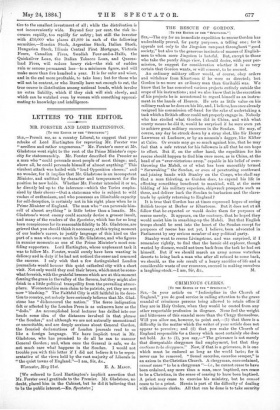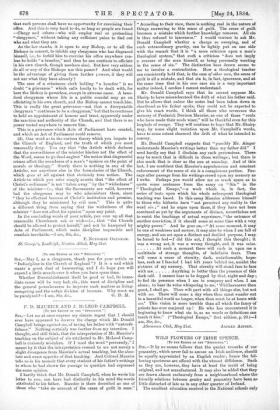CRIMINOUS CLERKS.
[TO THE EDITOR OF THE " SPECTATOR."] Sia,—In your article on " Indiscipline in the Church of England," you do good service in calling attention to the grave scandal of criminous persons being allowed to retain office if they are in Holy Orders, when they would be ousted from any other respectable profession in disgrace. None feel the weight and bitterness of this scandal more than the Clergy themselves. Will you allow me, however, to point out,—(1) that there is a difficulty in the matter which the writer of your article does not appear to perceive ; and (2) that you make the Church of England responsible for a theory which most certainly she does not hold. As to (1), you say,—" The grievance is not merely that disreputable clergymen find employment, but that they continue to be clergymen." Now, if that is a grievance, it is one which must be endured as long as the world lasts; for it never can be removed. " Semel sacerdos, sacerdos semper," is an axiom in the Christian Church. A clergyman, once ordained, cannot cease " to be a clergyman "—i.e., he cannot cease to have been ordained, any more than a man, once baptised, can cease to be a Christian, in the sense of ceasing to have been baptised. A priest may cease to exercise his ministry, but he cannot cease to be a priest. Herein is part of the difficulty of dealing with criminous clerks. All that can be done is to take security
that such persons shall have no opportunity for exercising their office. And this is very hard to do, so long as people are found —Clergy and others—who will employ real or pretending "clergymen," without taking any sufficient pains to find out who and what they are.
As the law stands, it is open to any Bishop, or to all the Bishops in concert, to inhibit any clergyman who has disgraced himself, i.e., to forbid him to exercise his office anywhere (un- less he holds " a benefice," and then he can continue to officiate in his own church, though nowhere else). But bow very seldom do all or any of the Bishops use this power ? And what would be the advantage of giving them further I owers, if they will not use what they have already ?
The case of a criminons clerk holding "a benefice" is no doubt " a grievance " which calls loudly to be dealt with, for here the Bishop is powerless, except in extreme cases. A bene- ficed clergyman whose life is a public scandal may go on officiating in his own church, and the Bishop cannot touch him. This is really the great grievance—not that a disreputable clergyman " continues to be a clergyman," but that he continues to bold an appointment of honour and trust, apparently under the sanction and authority of the Church, and that there is no power vested anywhere to remove him.
This is a grievance which Acts of Parliament have created, and which an Act of Parliament could remove.
(2). One word as to the curious theory which you impute to the Church of England, and the truth of which you most reasonably deny. You say that "the Article which declares that the unworthiness of the minister hinders not the effect of the Word, seems to go dead aaginst " the notion that disgraceful crimes affect the soundness of a man's "opinion on the point of morals or theology." Surely there is nothing in any of the Articles, nor anywhere else in the formularies of the Church, which goes at all against that obviously true notion. The Article to which you refer simply asserts that "the effect of Christ's ordinance" is not " taken away " by the " wickedness " of the minister—i.e., that the Sacraments are valid, however bad the clergyman may be who administers them, since "they be effectual because of Christ's institution and promise, although they be ministered by evil men." This is quite a different thing from saying that the wickedness of the minister does not affect his opinion" upon any point.
In the concluding words of your article, you sum up all that reasonable Churchmen ask or wish—i.e., that "the Church should be allowed to protect herself," and not be hampered by Acts of Parliament, which make discipline impossible and scandals inevitable.—I am, Sir, &c.,

































 Previous page
Previous page